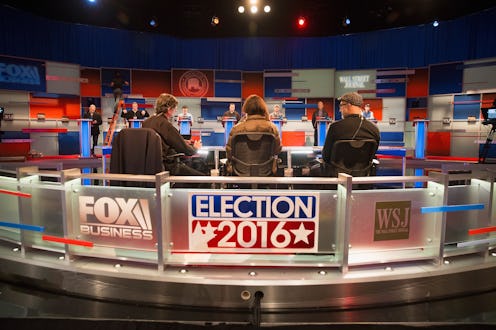News
How Debates Should Be Set Up
As we approach the second Democratic debate, it occurs to me how lucky the Democratic candidates have been in terms of moderators — first Anderson Cooper, now John Dickerson. Their Republican counterparts haven't been quite as fortunate, according to their standards. But although it's not fair to blame all the problems that pop up during a debate on the moderator or organization hosting, why don't we let non-media moderators host the debates?
It makes sense why journalists have been the go-to moderators for primary and presidential debates. Journalism is supposed to be non-biased, which helps to provide for a fair debate. The publications that sponsor the debate have the political capital to cover the cost, and it seems like a great idea to have the people who research and fact-check for a living write the questions. Reporters are also more likely to catch the candidates in contradictory statements or outright lies based on their knowledge of the candidates and their politics.
But as we've seen in this cycle, journalists have their flaws as well. Networks hosting them are desperate for ratings, which is likely why the second GOP debate was essentially CNN's Hunger Games as candidates were encouraged to attack and devour each other alive. Meanwhile, the third GOP debate featured several moderators from CNBC who hardly felt unbiased and, at times, seemed more interested in proving candidates wrong than facilitating conversation.
The solution to these problems are simple: take the debates away from the media.
Imagine a debate moderated and facilitated by experts in the areas that the candidates discuss. Instead of pulling in economic journalists for a debate on the economy, why not have actual economists craft the questions? If the candidates want to talk about their foreign policy experience, why not make them explain their policies to combat veterans or analysts? Or, to avoid allegations of bias, allow each debate to be moderate by two leading politicians from various states — of differing political affiliations.
Or perhaps the debates could take a more grassroots approach. Instead of having journalists speak for American voters, why not let voters ask the questions themselves? Who is better equipped to ask candidates about education, student loans, and job growth than the students currently facing these struggles? Candidates who want to restrict abortion access should have to explain their positions to a panel of women; immigrants and first-generation Americans should guide the discussion on immigration reform; and victims of gun violence should sit next NRA supporters while discussing gun control.
While a debate such as this is likely to be far less structured, it poses a serious challenge for candidates. Not only do they have to look their constituents in the eyes while discussing the policies that will affect them, but it makes it difficult to blame the moderators when a debate goes bad. As seen in the CNBC debate, the GOP candidates enjoyed blasting the "liberal" media and blamed moderators for asking nasty questions they didn't want to answer. But would Ted Cruz seriously dare to blame students for why his debate performance was poor? And imagine the RNC suspending their debate contract with a caucus of black women voters.
Even without shaking up the entire structure of the modern debate (which is very overdue), there are substantial steps that could be taken to improve their quality and content, and removing the media's influence from them may be a crucial first step. The debates we've had so far have been treated like circuses, especially by the networks hosting them. Because they allow networks to make a small fortune off of advertising and ratings, the debates have become less about substance and more about sensationalism. Even assigning one solid journalist (such as Megyn Kelly or Cooper) to cover all of the debates through the season would be an improvement.
We're still a year out from presidential elections, which means that we have many, many debates ahead of us. For the networks, the debates are running like a dream. But for the actual electorate, something needs to change. And if all else fails, we could always just get Jon Stewart to moderate the debates. That's one media-type I could definitely get behind.
